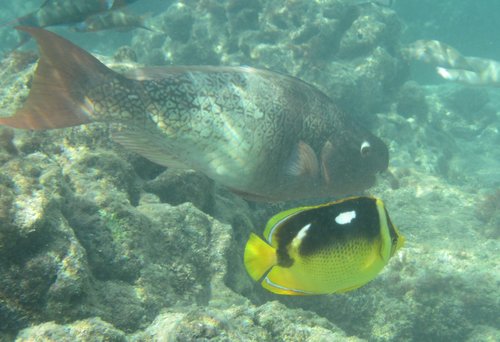
Aquarium Fishing and Hawaiian Culture
by Makani Christensen, February 6, 2019
The Ancient Hawaiians were practical people that utilized their natural resources to sustain life and enhance their living conditions. If we look through history, we see that not much has changed. Today, Hawaiians still depend on their natural resources to survive. We remain resourceful and hard-working, which allows us to thrive off the land.
One of the current hot topic items in Hawaii is aquarium fishing. At this point, aquarium fishing is the most studied and regulated fishery in the Hawaiian Islands. It is still a relatively new fishery. Ancient Hawaiians did not target these fish, as there was no practical use for them prior to Captain Cook arriving in 1778. As an industry, aquarium fishing was simply nonexistent in ancient Hawaiian culture.
Many environmentalist groups choose to focus on this fact alone, proposing severe limitations and bans aquarium fishing as it was not initially part of Hawaiian culture. This view is incorrect, and in fact contrary to the values at the heart of Hawaiian Culture.
While we still preserve the idea of utilizing our natural resources to survive, our culture has evolved. We now depend not only on the land, but on money for sustainability. Hawaiians have found new ways to feed their families and fuel Hawaii’s economy. The aquarium fish trade allows Hawaiian people to practice our culture by gathering from our resources, as did our ancestors.
Although Hawaiian culture is, in many ways, a positive model for our current society, it is not without its own flaws. There is a disjoint between what people believed the ancient Hawaiians to be, and what they actually were. It is commonly thought that Hawaiians never over harvested their resources, which is simply not true. Take, for example, Kamehameha, who sent his people to the forest to collect sandalwood as a means to increase his own wealth and become a prominent force in Hawaii. Kamehameha utilized this resource to the point of depletion. To find the now scarce sandalwood, Hawaiians burnt entire forests, seeking out the sandalwood by smell. With the people of Hawaii diverting their full attention to Kamehameha Sandalwood Trade, farms lay fallow and famine lingered. Upon Kamehameha’s realization that his people were starving, he redirected the Hawaiians back to producing food.
When Kamehameha received cows from Captain Vancouver, he allowed them to roam, grow, and populate the island. The cows went wild. Although not native to the islands, Kamehameha understood the value of this new resource and utilized it to feed the people. Today, many traditional environmentalists along with the Department of Land and Natural resources would rather eradicate entire herds of cow, sheep, goats, pigs and deer to keep areas pristine. These new groups of environmentalists are constantly marketing fear and propaganda into the Hawaiian Culture until it becomes a truth. They are bending the decisions, values, and principles of politicians, Hawaiians, and our community by creating emotional value and using Hawaiians to push their agendas.
Hawaiians have learned, like any great culture, from mistakes that have occurred. We all want to preserve our natural resources. However, many seem to focus on false assumptions that Hawaiian culture was perfect, and we should emulate that by opposing anything new. In truth, our new ways of utilizing our resources are a testament to values established by ancient Hawaiian culture. Kamehameha is just an example of how Hawaiians have always adapted to their environments. We can continue to be practical and conservative of our resources, while at the same time, embracing innovation. Evolving new ways to utilize our resources, while maintaining the core values of our ancient culture, is what allows us to survive.